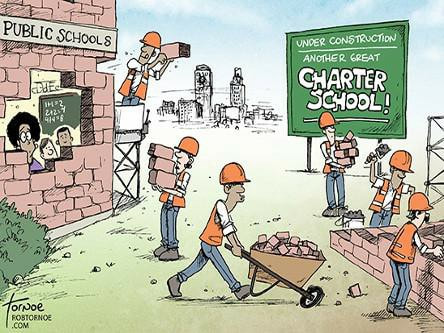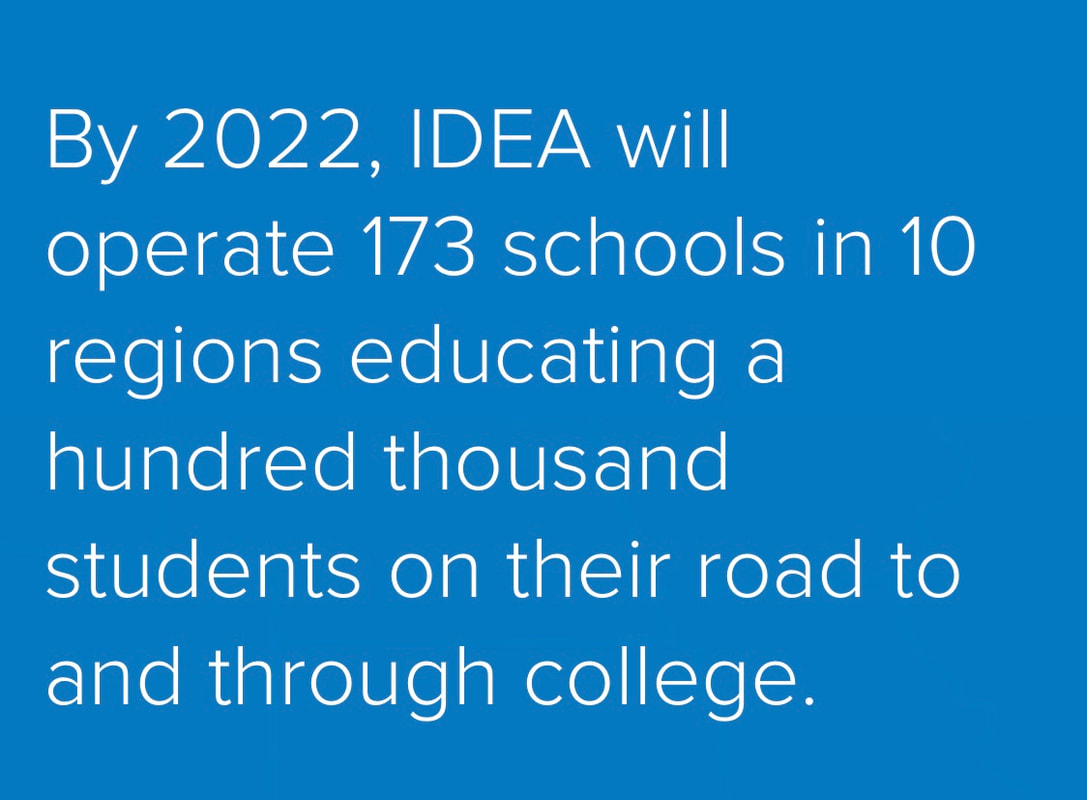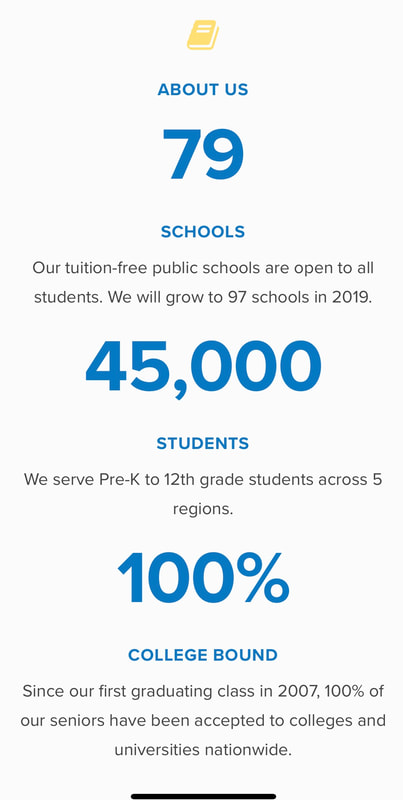
Well, that is exactly what is happening now as two horrible bills (HB 940/SB 796 and HB 939/SB 795) make their way through the Tennessee Legislature. We alerted you to the dangers of those bills in a prior blog, but since then, things have gotten much worse.
The Charter School expansion bill was amended last week and passed through the House Education Committee. With the new amendment, this bill will create a new nine member commission that is hand-picked by the Governor. The commissioners will eventually serve a term of five years. The proposed commission will be powerful. It will be able to approve charter school applications in every county in Tennessee and act as authorizer for its newly approved charter schools.
Essentially, this nine member commission will be given statutory authority under the proposed law to create an alternate school system of charter schools that is designed to compete against our current public school districts. In the end, we will see public schools run by local school boards declining as charter schools governed by the state appointees are given every opportunity to grow.
And there's more…
Only five members of this proposed commission are needed to constitute a quorum. So theoretically, a three person majority who knows nothing about your community has the power to make major decisions about your local schools. Three appointees, who have never set foot in your county, can decide who will serve as superintendent, where a school will be located, which company gets the bus contract or the food services contract, etc.
And as charter school proliferate and takeover public education, this commission will effectively replace the decision making power of every popularly elected school board in the state.
Make no mistake the State will act as a Charter School Authorizer
That is a BIG DEAL with many ramifications.
It upsets the power balance between state and local control over our schools. The proposed law will usurp the authority of our locally elected school boards then hands it over to an appointed state commission. This new charter school commission will answer only to the state Board of Education, another appointed body whose members are chosen by the Governor.
We have seen this type of power-grab during the Haslam administration when the State targeted underperforming schools for charter school conversion. Most of those schools were located in Shelby County with a few in Nashville and Chattanooga. But now, the power-grab will be statewide and with no restraints, prompting Rep. Antonio Parkinson from Memphis to tell his colleagues on the House Education Committee, "This opens up a nice little floodgate for the rest of y’all to see what we’ve been screaming bloody murder about. Y’all get a chance to feel what that feels like, and see what we’ve been screaming about the last few years.”
Charter School Authorizers have a lot of POWER in this bill
In Tennessee, elected school boards have certain duties including policy making, employing a director of schools, procuring goods and services, as well as approving a budget. Elected school boards act as a representative of their communities in deciding these important matters. And their decisions must be made in an open meeting after giving notice to the public.
However, under the proposed bill, all the powers of local school boards are explicitly given to this appointed commission.
The commission will have the power to set policies and procedures for school operations as well as procure goods and services including but not limited to "personal, professional, consulting, and social services." That's a lot of money that gets to be spent by this proposed commission whose only oversight comes from the state Board of Education. And if they follow Penny Schwinn's history of no-bid contracts benefitting her TFA buddies, we are in big trouble.
The appointed nine member commission will also have the authority to employ a director/superintendent of schools and that director will be answerable only to the commission. In a interesting twist, the bill requires commission members to have collective "experience and expertise in charter schools or charter school authorizing, public and nonprofit governance, finance, law, and school or school district leadership."
That is interesting because ordinarily, elected school boards only have to be adults with a high school diploma. It's also interesting because no such expertise is required of the director of schools who is charged of actually running the district and has the same duties and powers legally granted to all other directors of schools including the sole authority to hire, appoint, terminate, control personnel, etc. In addition to creating a staff, a school director's big responsibility is to develop a budget and make spending recommendations.
All in all, this bill puts a lot spending power in the hands of unelected people who serve at the will of the Governor.
Money, Money, Money….
With a new charter-friendly commission in place, you can bet Tennessee will be attracting some big name charter school chains from all over the nation. We all know, when charter school chains smell money, they come running.
And we bet we will be seeing one charter school chain, in particular.
IDEA based out of Texas touts itself to be "the fastest growing network of tuition free PreK-12 public charter schools in the United States" and it has big plans for expansion.

Surprise, Surprise...
It is none other than Paul Schwinn, the husband of Tennessee's Education Commissioner, Penny Schwinn. And according to Linkin, he is still employed by the Texas charter school chain despite his family's recent move to Tennessee. And we know, the Schwinns have a history of working together without regard to conflicts of interest.
"Last Spring, the Delaware DOE hired Mrs. Penny Schwinn, a charter school leader from Sacramento, as the Chief Accountability and Performance Officer. Months later, Mr. Paul Schwinn, her husband, has been hired as the Director of Leadership Development for the Delaware Leadership Project, which is funded by the Delaware DOE, Rodel and Vision. I know the Delaware DOE wants family involvement, but this is a clear conflict of interest. The wheels on the Schwinn go round and round…"
IDEA makes a lot of big claims about success.
1) IDEA Charter schools do not enroll “underserved” students regardless of the measure used to identify “underserved.” Specifically, as compared to schools in the same market, IDEA schools enroll lower percentages of economically disadvantaged students, special education students, bilingual education students, students requiring modifications or accommodations on the Texas Assessment of Knowledge and Skills (TAKS), and students scoring below average on the TAKS mathematics or TAKS readings tests.
2) IDEA Charter schools send 100% of graduates to post-secondary institutions of higher education only if the actual number of graduates is the group of students examined. If we consider the number of students starting in the 9th grade as the cohort of students of interest, then the percentage of IDEA students entering post-secondary institutions of higher education is, at best, around 65% for the cohort of 9th grader students in 2009.
3) One reason why IDEA secondary schools outperform high schools in the same area is because IDEA Charter schools lose a greater proportion of lower performing students than higher performing students. This disproportionate disappearance rate of students would increase overall TAKS scores at the school and district levels even if the remaining students made no increase in achievement
While further study of additional cohorts is needed, this preliminary study strongly suggests that claims of academic superiority and helping the “underserved” students in the Rio Grande Valley are simply false or misleading. More importantly, this study calls into serious question the claim that IDEA Charter schools have the background, experience, and track-record necessary to educate all types of students in East Austin. This study suggests that IDEA Charter schools rely in part on the “creaming/skimming” of students and the student disappearance of lower performing students to achieve their success.


